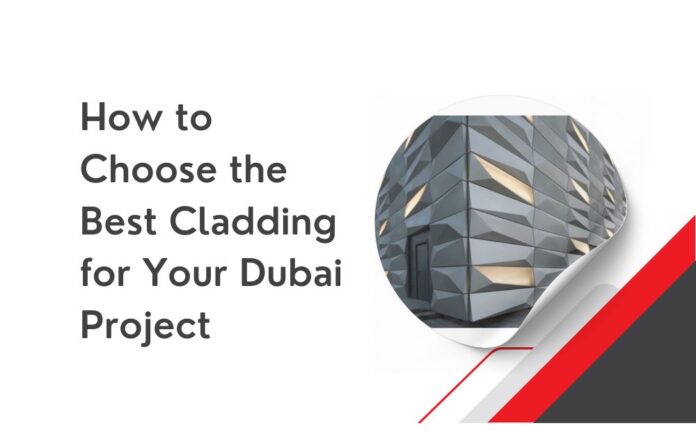Choosing the right cladding for your building project in Dubai is essential. Cladding not only enhances the appearance of your building but also provides important protection against the harsh weather conditions in the region. This blog will guide you through the process of selecting the best cladding for your Dubai project, making it easy to understand and apply.
Understanding Cladding and Its Importance
What is Cladding?
Cladding is a layer of material attached to the exterior of a building to protect it from the elements and improve its appearance. It can be made from various materials, including metal, wood, vinyl, and composite materials.
Why is Cladding Important?
Cladding serves multiple purposes:
- Protection: It shields the building from rain, wind, and sunlight, preventing damage and prolonging the building’s life.
- Insulation: Cladding can improve the thermal insulation of a building, keeping it cooler in the summer and warmer in the winter.
- Aesthetics: It enhances the visual appeal of the building, making it more attractive and increasing its value.
- Maintenance: Cladding can reduce maintenance costs by protecting the underlying structure from weather damage.
Note – Transform your Dubai project with the best cladding solutions! Enhance aesthetics, improve insulation, and ensure long-lasting protection against harsh weather. Choose from a wide range of high-quality materials to suit your design and budget. Contact us today for expert advice and a free consultation. Let’s create a stunning, durable exterior for your building with our premium cladding services. Discover more now!
Factors to Consider When Choosing Cladding
Climate and Weather Conditions
Dubai’s climate is characterized by high temperatures, intense sunlight, and occasional sandstorms. When choosing cladding, consider materials that can withstand these conditions without deteriorating.
Heat Resistance
- Metal Cladding: Metals like aluminum and steel are durable and resistant to heat, making them suitable for Dubai’s climate.
- Composite Materials: These often have good heat resistance and are designed to last in harsh conditions.
UV Resistance
- Vinyl Cladding: UV-resistant vinyl can withstand prolonged exposure to sunlight without fading or cracking.
- Wood Cladding: Treated wood can also be UV-resistant, but it may require more maintenance.

Aesthetic Appeal
The appearance of your building is crucial, especially in a city like Dubai where architectural beauty is highly valued.
Modern Look
- Metal and Glass: For a sleek, modern appearance, metal and glass cladding are excellent choices.
- Composite Panels: These can be designed to mimic various finishes, including stone and wood, offering versatility in design.
Traditional Look
- Stone Cladding: Natural stone provides a timeless, elegant look that blends well with traditional architectural styles.
- Wood Cladding: Wood offers a warm, natural appearance that can be customized with different stains and finishes.
Durability and Maintenance
Consider the longevity and maintenance requirements of the cladding material.
Long-Lasting Materials
- Metal Cladding: Known for its durability and low maintenance, metal cladding can last for decades.
- Fiber Cement: This material is resistant to rot, fire, and insects, making it a durable option.
Low Maintenance
- Vinyl Cladding: Requires minimal maintenance and is easy to clean.
- Composite Cladding: Often designed to be maintenance-free and resistant to weathering.
Types of Cladding Materials
Metal Cladding
Aluminum and Steel
- Advantages: Lightweight, durable, and resistant to corrosion.
- Applications: Suitable for both residential and commercial buildings.
Copper and Zinc
- Advantages: Offer unique aesthetic qualities and develop a natural patina over time.
- Applications: Ideal for high-end projects and buildings that require a distinctive look.
Composite Cladding
Fiber Cement
- Advantages: Combines the durability of cement with the appearance of wood or stone.
- Applications: Versatile and suitable for a variety of architectural styles.
High-Pressure Laminate (HPL)
- Advantages: Resistant to impact, weather, and UV radiation.
- Applications: Commonly used for commercial buildings and modern residential projects.
Natural Materials
Wood Cladding
- Advantages: Provides a natural, warm appearance and is available in various types and finishes.
- Applications: Suitable for traditional and contemporary designs.
Stone Cladding
- Advantages: Offers a timeless, elegant look and excellent durability.
- Applications: Ideal for high-end residential and commercial projects.
Synthetic Materials
Vinyl Cladding
- Advantages: Cost-effective, easy to install, and available in various colors and styles.
- Applications: Commonly used for residential buildings.
PVC Cladding
- Advantages: Lightweight, durable, and resistant to moisture and insects.
- Applications: Suitable for both interior and exterior applications.
Installation and Costs
Installation Process
Professional Installation
- Benefits: Ensures proper fitting and longevity of the cladding.
- Considerations: Hire experienced professionals with a good track record.
DIY Installation
- Benefits: Can save on labor costs.
- Considerations: Requires skill and knowledge of the material being used.
Cost Considerations
Initial Costs
- Material Costs: Prices vary widely depending on the type of cladding chosen.
- Labor Costs: Professional installation can add to the overall expense.
Long-Term Costs
- Maintenance: Some materials require more upkeep than others.
- Durability: Investing in durable materials can reduce long-term costs.
Environmental Impact
Sustainability
- Recycled Materials: Choose materials with a high percentage of recycled content.
- Sustainable Sources: Opt for wood from sustainably managed forests.
Energy Efficiency
- Insulation Properties: Good insulation can reduce energy consumption for heating and cooling.
- Reflective Materials: Some cladding materials can reflect sunlight, reducing cooling costs.
Choosing the Right Supplier
Research and Reviews
- Supplier Reputation: Check reviews and ask for references.
- Product Range: Ensure the supplier offers a variety of materials and styles.
Quality Assurance
- Certifications: Look for certified products that meet industry standards.
- Warranties: A good warranty can provide peace of mind.
Conclusion
Choosing the best cladding for your Dubai project involves considering various factors such as climate, aesthetics, durability, maintenance, cost, and environmental impact. By understanding these factors and the different types of cladding materials available, you can make an informed decision that enhances the beauty and functionality of your building. Always remember to consult with professionals and choose reputable suppliers to ensure the best results for your project.
For more insightful articles related to this topic, feel free to visit getmeta.co

